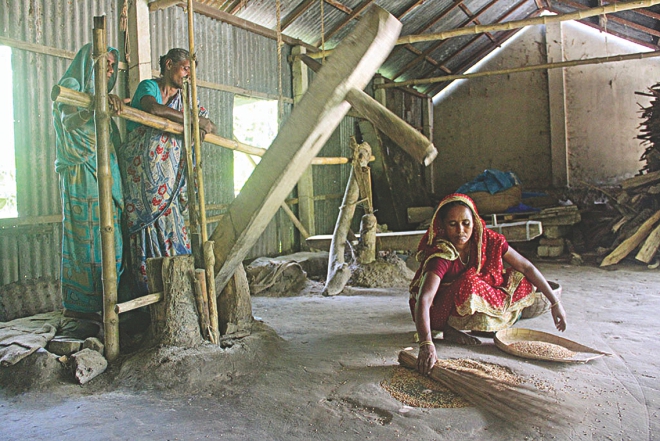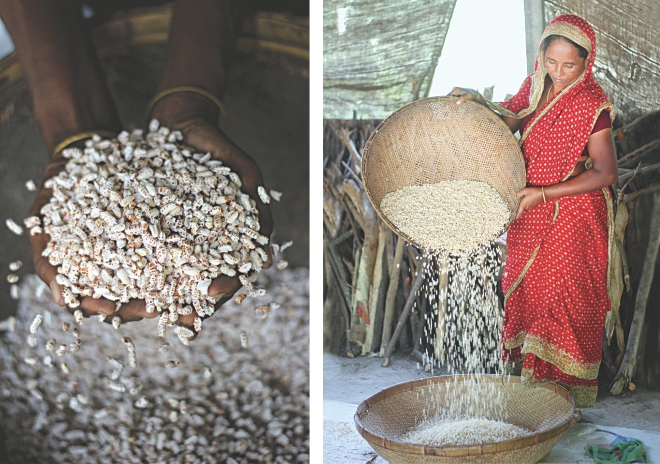Preserving a Lifestyle

Food has become a major source of concern of late for us Bangladeshis. The main cause of this is artificial preservatives and chemical fertilisers and pesticides that have negative effects on health, in some cases causing death. In such times, we look for healthy produce, preferably those which have been farmed using organic methods. One of the organisations bringing healthy food to us is Prabartana, in association with UBINIG (Unnayan Bikalper Nitinirdharoni Gobeshona), which is a policy and research organisation.
Formed in 1984 by a group of activists who support the peoples' movement for social, economic, political and cultural transformation, UBINIG's goal has been to work at a community level in various districts of the country to preserve respectful and responsible lifestyle.
One of their projects is to conserve the traditional methods of farming in our various districts and keep alive our local crops, some of which are on their way to extinction.
“The concept of organic farming is that local seeds are used to grow crops,” says Rabiul Islam Chunnu, coordinator, UBINIG's Tangail Centre. “We believe that our farmers' main strength lies in these seeds. If they do not possess these, they become dependent on multinational companies for hybrid seeds which are only good for one time use. We encourage the use of local seeds and natural compost in farming, so that farmers can hold on to their seeds and reuse them later.”

According to Rabiul, organic farming is slightly more costly because the productivity is less than it would be with hybrid seeds. “Although we do have varieties of seeds that have very high rates of productivity, but over time these have become quite rare,” explains Rabiul. “For years, we have worked to explain and convince local farmers of the merits of organic farming and still continue to do so. In each village, we take on groups of 15 to 20 farmers at a time and train them in organic farming methods. If we are not successful in explaining to them the importance of these home grown seeds, they will become extinct. In which case any multinational company can have a monopoly in the agricultural sector of our country and they will decide which crops we produce.”
Rabiul explains that in the past, we had three main harvest seasons, Aaush, Amon and Boro but now, the Aaush crops are already on their way to extinction. “During the Aaush season our field workers are basically unemployed for five to six months whereas once this was their busiest season,” he says.
UBINIG has centres in nine districts all over the country. “From Cox's Bazaar, we get beans of different varieties, lentils and chola (chickpeas), Kushtia has akher gur (sugarcane molasses) which is available in Probortona, from Tangail we get khoi, muri (puffed rice) and paddy, from Ishwardi we get different types of spices. We also have centres in Rajshahi, Noakhali, Sirajganj, Jamalpur and Sherpur and we get different kinds of crops of each of these,” says Rabiul.
At UBINIG, they train farmers to use natural pesticides made of neem leaves which have a bitter taste and other natural material. They also advice farmers to grow mixed crops because when there is crop diversity, the pest infestation is significantly lower.
“We also connect farmers from different areas so they can communicate about methods etc,” says Rabiul. “We are affiliated with different international organisations, such as HEX (Switzerland) and SIDA (Swedish International Development Cooperation Agency) who are also donors, and they help us get in touch with farmers abroad who are working with related projects. We have farmer exchange programs that allow us to send our farmers abroad to learn their techniques and vice versa.”
UBINIG has been working on food sovereignty for the past twenty years reaching out to local farmers, explaining to them the importance of conserving their heritage, which is ultimately our greatest strength.



 For all latest news, follow The Daily Star's Google News channel.
For all latest news, follow The Daily Star's Google News channel. 



Comments